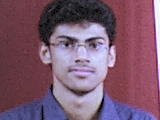 [ D-Wave's 16-qubit quantum computer]
[ D-Wave's 16-qubit quantum computer]
Recently ,I wrote an article on "QUANTUM COMPUTERS" ,that got published on my college newsletter!!! here is my article-
QUANTUM COMPUTING -The massive amount of processing power generated by computer manufacturers has not yet been able to quench our thirst for speed and computing capacity .First we built computers on vacuum tube ,then on transistors and later IC’s and in recent ,we use microprocessors AND now we are building computers at molecular level to satisfy our thirst for computing!!. Its called is “QUANTUM COMPUTERS”. Today's computers, like a Turing machine, work by
manipulating bits that exist in one of two states: a 0 or a 1. Quantum computers aren't limited to two states; they encode information as quantum bits, or qubits, which can exist in superposition. Qubits represent ions, photons or electrons and their respective control devices that are working together to act as memory and a processor .In other words ,the symbols are both 0 and 1 at the same time, While a normal Turing machine can only perform one calculation at a time, a quantum Turing machine can perform many calculations at once. This superposition of qubits is what gives quantum computers their inherent parallelism. Quantum computers work on quantum mechanics ,with this incredible power ,there are also some major challenges!!!! One problem with the idea of quantum computers is that if you try to look at the subatomic particles, you could bump them, and thereby change their value. If you look at a qubit in superposition to determine its value, the qubit will assume the value of either 0 or 1, but not both (effectively turning your spiffy quantum computer into a mundane digital computer). Quantum computers could one day replace silicon chips, just like the transistor once replaced the vacuum tube. But for now, the technology required to develop such a quantum computer is beyond our reach. Most research in quantum computing is still very theoretical . If functional quantum computers can be built, they will be valuable in factoring large numbers, and therefore extremely useful for decoding and encoding secret information. If one were to be built today, no information on the Internet would be safe. Our current methods of encoding are simple compared to the complicated methods possible in quantum computers. Quantum computers could also be used to search large databases in a fraction of the time that it would take a conventional computer. Other applications could include using quantum computers to study quantum mechanics, or even to design other quantum computers. But quantum computing is still in its early stages of development, and many computer scientists believe the technology needed to create a practical quantum computer is years away. Quantum computers must have at least several dozen qubits to be able to solve real-world problems, and thus serve as a viable computing method.
QUANTUM COMPUTING -The massive amount of processing power generated by computer manufacturers has not yet been able to quench our thirst for speed and computing capacity .First we built computers on vacuum tube ,then on transistors and later IC’s and in recent ,we use microprocessors AND now we are building computers at molecular level to satisfy our thirst for computing!!. Its called is “QUANTUM COMPUTERS”. Today's computers, like a Turing machine, work by
manipulating bits that exist in one of two states: a 0 or a 1. Quantum computers aren't limited to two states; they encode information as quantum bits, or qubits, which can exist in superposition. Qubits represent ions, photons or electrons and their respective control devices that are working together to act as memory and a processor .In other words ,the symbols are both 0 and 1 at the same time, While a normal Turing machine can only perform one calculation at a time, a quantum Turing machine can perform many calculations at once. This superposition of qubits is what gives quantum computers their inherent parallelism. Quantum computers work on quantum mechanics ,with this incredible power ,there are also some major challenges!!!! One problem with the idea of quantum computers is that if you try to look at the subatomic particles, you could bump them, and thereby change their value. If you look at a qubit in superposition to determine its value, the qubit will assume the value of either 0 or 1, but not both (effectively turning your spiffy quantum computer into a mundane digital computer). Quantum computers could one day replace silicon chips, just like the transistor once replaced the vacuum tube. But for now, the technology required to develop such a quantum computer is beyond our reach. Most research in quantum computing is still very theoretical . If functional quantum computers can be built, they will be valuable in factoring large numbers, and therefore extremely useful for decoding and encoding secret information. If one were to be built today, no information on the Internet would be safe. Our current methods of encoding are simple compared to the complicated methods possible in quantum computers. Quantum computers could also be used to search large databases in a fraction of the time that it would take a conventional computer. Other applications could include using quantum computers to study quantum mechanics, or even to design other quantum computers. But quantum computing is still in its early stages of development, and many computer scientists believe the technology needed to create a practical quantum computer is years away. Quantum computers must have at least several dozen qubits to be able to solve real-world problems, and thus serve as a viable computing method.





Nice Blog!
ReplyDeleteCan You Elaborate on ordinary turing machine and quantum turing machine.
the present day comps can handle multiple tasks at a time, you must be familiar with timesharing(multitasking) feature of processor. Did you mean even this is quantum comps?